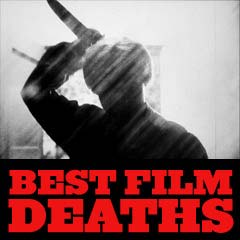
|
Deaths Scenes 1992 |


|
The main protagonist of the Alien series of franchise sci-fi horror films was female heroine Lt. Ellen Ripley (Sigourney Weaver). In this third installment by director David Fincher (his directorial debut), Ripley discovered that the embryo of an Alien Queen was growing inside of her. The Weyland-Yutani Corporation had plans to use the "magnificent" Alien specimen as a biological weapon. In the film's downbeat ending, she was able to exterminate the Alien by thermal shock, but then was forced to make the ultimate suicidal sacrifice to kill the about-to-be-born Alien embryo. She executed a free-fall (in a crucifix pose) backwards into a gigantic foundry vat of molten metal, as the screeching alien queen embryo burst out of her chest during her fall. She grabbed it to prevent it from escaping, and took it to its death. |
 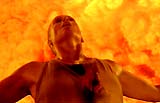 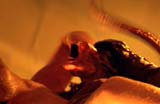 Two Deaths: Ripley and the Alien Embryo |
||||||
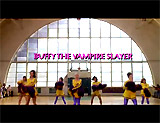
|
Buffy the Vampire Slayer (1992) Before the successful TV series starring Sarah Michelle Geller, this comedy/horror film from writer Joss Whedon initiated the main title character:
She reluctantly found out that she was a warrioress vampire-hunter (The Slayer), and was destined to fight against the hordes of undead, led by Lothos (Rutger Hauer). One of the lead vampire's minions was Amilyn (Paul Reubens, or Pee Wee Herman) who suffered an exaggerated, hysterically comical, hammed-up, agonizingly-long death scene. After he was stabbed in the heart with a ruler by Buffy, he cursed at her: "You're gonna wish you'd died." He slid to the floor, but rose up again and moaned, unconvincingly:
Then, after looking at Buffy, he unconvincingly said another: "Ooh, ah", then fell to the floor. He kicked the wall a few times in rhythm to the "Oohs" and "Aahs," and continued to cry out: "Ooh, ah" before slumping over. He even suffered some more pains after the credits rolled. |
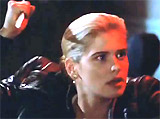 Buffy, the Vampire Slayer 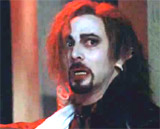 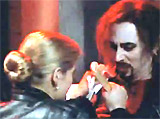 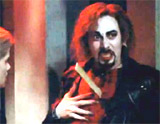 Stabbing of Amilyn With Ruler: "Ooh, ah, Ow, ah, ooh, ah!" |
||||||
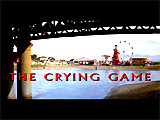
|
The Crying Game (1992, UK) In the conclusion of Irish writer/director Neil Jordan's jolting, suspenseful and twisting thriller, femme fatale IRA accomplice/assassin Jude (Miranda Richardson) entered the apartment of androgynous, transgender nightclub singer/hairdresser Dil (Jaye Davidson). She found her tied-up accomplice, IRA member Fergus/Jimmy (Stephen Rea) and Dil lying together on the bed. As she held a gun with extended arms at Fergus, she blurted out: "You stupid s--t, once was bad enough, but twice." She was shot repeatedly by Dil who sarcastically greeted her:
As Jude writhed about wounded on the floor, she grabbed for her gun, but Dil shot it away, as he confronted her. Dil accused her of being complicit in the death of lover Jody (Forest Whitaker), a British soldier. [Note: Jody - who tried to escape, was accidentally killed in a traffic accident by a convoy of British army soldiers.] Dil said that she had entrapped Jody by seducing him while he was intoxicated - and thereby had fooled him.
It was an angry, vengeful murder - the shot in the throat decisively killed Jude. Dil then held the gun on Fergus, who had untied himself from the bed. Dil received confirmation from Fergus/Jimmy about Jude's presence:
Fergus sighed and declared: "Can't remember." In the following scene, Dil turned the gun on Fergus, but admitted: "I can't do it, Jimmy. He (Jody) won't let me." Fergus reassuringly took the gun away when Dil put the gun in his mouth to commit suicide, and asked him with deep love and caring to run away (and hide out until later) - promising Dil he would see him again. After Dil fled, the police arrived on the street below. Fergus took the gun, wiped Dil's fingerprints from it (thereby replacing Dil's prints with his own), and spoke to Jody's smiling picture:
He then sat down as he waited for the police to arrest him in Dil's place. Subsequently, Fergus (who took the fall for Dil) was sentenced to six years in prison. |
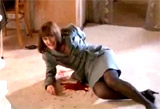 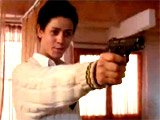 Dil Threatening Jude 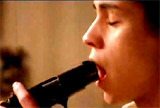 Dil's Threat to Kill Himself 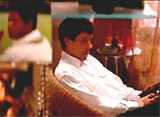 Fergus/Jimmy Awaiting Arresting Police |
||||||
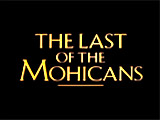
|
The Last of the Mohicans (1992) Michael Mann's lush version of James Fenimore Cooper's 1826 novel was a melodramatic romantic adventure film set during the French and Indian Wars of the 1750s in the American colonies. In the film's dueling climax, two Indians fought with each other:
Chingachgook was avenging the death of his son Uncas (Eric Schweig), the last of the Mohican tribe, who had just been killed during one-on-one combat with Magua (and had his body dumped off a sheer-rock cliff face). Chingachgook then delivered a poignant eulogy for his son in the film's final lines of dialogue, calling himself the "last of the mohicans":
|
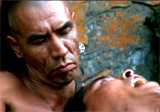 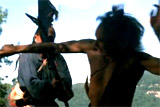 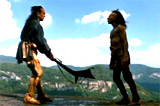 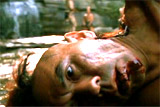 Chingachgook vs. Magua 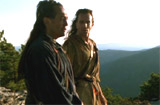 "Last of the Mohicans" Eulogy |
||||||

|
Like Water for Chocolate (1992, Mex.) (aka Como Agua Para Chocolate) Earlier in this Mexican film directed by Alfonso Arau, Dr. John Brown (Mario Ivan Martinez) explained about how each person had an inner box of matches that could potentially be ignited by emotions. He warned that the flame that was in everyone might cause death if it went out or became too bright:
The two main lovers in the film, who were mostly denied fulfillment and the attainment of love, were:
At the end of the film, with everyone dead or married off, Tita and Pedro finally were able to make love without interruption (they had once consummated their love earlier) in a candle-filled bedroom, as lightning flashed outdoors. As Pedro screamed out his love for Tita ("I love you!") during orgasm, his 'inner matches' exploded in passion and produced literal sparks and he promptly died. Tita swallowed matches to regain the flame inside her, and set the entire house on fire in the process. Their bedroom erupted in flames - reuniting their souls in a radiant tunnel in the hereafter where they lived together in their "buried love" - without judgment by others. |
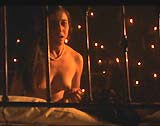  Pedro's Orgasmic Death 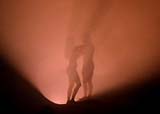 Ignited Love |
||||||
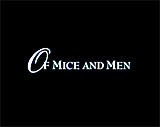
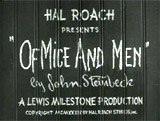
|
Of Mice and Men (1992) John Steinbeck's 1937 novel was the source for a Depression-Era story of two migrant-working drifters who were seeking to fulfill their dreams:
Lennie accidentally killed a farmhouse wife (Sherilyn Fenn) by inadvertently crushing and breaking her neck when he tried to silence her screams after stroking her soft hair. Afterwards, Lennie picked up her rag-doll body and reprimanded her: "You done a bad thing" and then turned it back on himself: "I done a really bad thing" before running off. She was married to the ranch boss' son Curley (Casey Siemaszko), who was hot-headed for revenge. George sensed it was an accidental death ("He's nuts. He never done this to be mean") but couldn't call off the vigilante lynch mob. Before a tragic and tear-jerking mercy killing in the film's final scene, George promised his friend that they would finally have a place of their own - he distracted Lennie with the retelling of their dream of a ranch of their own:
Lennie's last pitiful words were about his oft-repeated task. Lennie was killed with a gunshot to the back of the head, to spare him from retaliatory wrath.
|
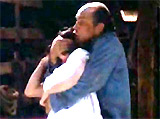 Accidental Murder of Curley's Wife  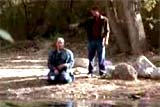  Lennie's Mercy Killing: "And I get to tend the rabbits" 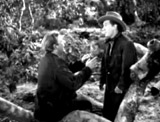 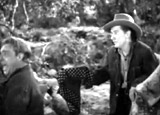 1939 version |
||||||

|
Reservoir Dogs (1992) Writer/director Quentin Tarantino's popular and influential cult independent film (his debut feature film) was about a code-named gang that executed a simple jewelry heist. It was notable for a very prolonged and realistic death scene, seen in repeated views, of Mr. Orange (Tim Roth) as he painfully bled to death from a bullet in the stomach. When the robbery went horribly wrong (Mr. Pink (Steve Buscemi) thought it was a possible police set-up), Mr. Orange was suffering from a "gut shot" when he was hit in the abdomen by a female driver (whose car he was trying to steal), and was brought back to the abandoned coffin warehouse rendezvous point. Mr. White (Harvey Keitel) reassured his dying partner:
Eventually, Mr. Orange revealed that he was an LAPD snitch named Freddy Newandyke. He shot Mr. Blonde (Michael Madsen), who was in the middle of torturing captured police officer Marvin Nash (Kirk Baltz) - his right ear had been cut off and he was about to be set on fire with gasoline. Fabricating a story ("I swear on my mother's eternal soul"), Orange then told other gang members that Mr. Blonde was going to double-cross and rip off everyone ("He was gonna kill us, take the satchel of diamonds and scram"). Enraged, Eddie shot and killed Marvin. After a Mexican stand-off that finished off most of the heist group, badly-wounded Mr. Orange told one of the only surviving members, Mr. White, while cradled in his lap that he was a police informant ("I'm a cop"). The film ended with an enraged Mr. White pointing his gun at Mr. Orange's head and possibly killing him (off-screen), as police entered the warehouse, assaulted Mr. White, and ordered him to drop his gun. The officers also (off-screen) forced Mr. Pink to give up outdoors as he was trying to escape with the diamonds. |
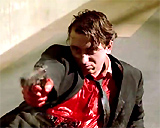 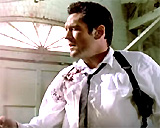 Mr. Orange Killing Mr. Blonde 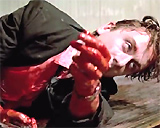 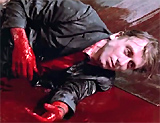 Mr. Orange Wounded and Bleeding to Death 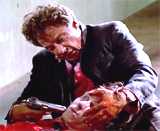 Mr. White With Gun Pointed at Mr. Orange |
||||||
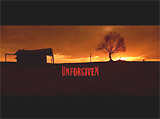
|
In Clint Eastwood's produced/directed Best Picture-winning western, aging killer/outlaw Will Munny (Clint Eastwood) rode into town to avenge the death of his friend Ned Morgan (Morgan Freeman), another retired gunfighter. He saw Ned's corpse propped up and mounted inside a coffin on the front porch of Greely's, with a sign reading:
Fearlessly, he entered the bar with his raised shotgun, and cocked it. Following his own code of retribution and redemption, Will first asked: "Who's the fella owns this s--thole?" Unarmed Skinny Dubois (Anthony James) spoke up tentatively: "I-I own this establishment. Bought it from Greely for a thousand dollars" before he was shot dead. Munny added: "He should have armed himself if he's gonna decorate his saloon with my friend." Will identified himself as he had always been remembered, and conformed to his reputation as the meanest and most fearsome killer:
Will's grim mission of moral revenge, in loyalty to Ned, brought a tense stand-off between the cool-headed Sheriff and the "mangy scoundrel." When Will's gun misfired, he tossed his worthless shotgun at the Sheriff to distract him, and then fired at Little Bill and some of his deputies (Clyde, Andy, and Fatty) with the rifle. He wounded Little Bill and killed five of the others. With his pistol drawn, Will brutally warned the others who cowered before him: "Any man don't want to get killed better clear on out the back." Entirely at Will's mercy after his gun was shot away, Little Bill pleaded and lamented that he wouldn't live long enough to enjoy his dream house in old age:
After an extended pause with the gun barrel floating above Little Bill's head, Munny blasted him - unforgiven. Striding out of the saloon, he shot a moaning and wounded Clyde, and then crouched down and yelled a further warning to anyone on the street who dared to shoot at him as he left town:
He took one last look at Ned in the coffin. As he rode from town, he commanded further frontier justice for Ned and for the prostitutes:
|
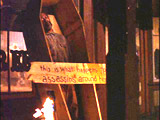 Ned's Corpse  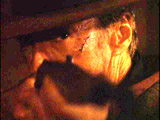 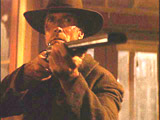 William Munny: "I'm here to kill you, Little Bill" 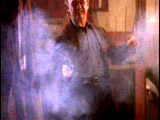 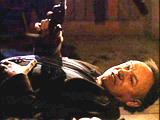 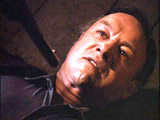 Little Bill: "I don't deserve this. To die like this." |
||||||

|
Universal Soldier (1992) Director Roland Emmerich's sci-fi action film, set partly during the Vietnam War era, concentrated on two major characters. They were both muscle-bound futuristic robots or UniSols (or "universal soldiers") - elite, semi-android, bionic anti-terrorists to be part of and serve in a special high-tech SWAT team of previously-dead soldiers:
They killed each other during combat in the Vietnam War in the late 1960s, and then were reanimated by the military as highly-advanced, metallic fighters in a top-secret Army project in the 1990s, 25 years later. The memories of the combat robots were supposedly wiped clean, but they suffered flashbacks. They were also mostly pain-free, self-healing, emotionless, and extraordinarily strong. At Deveraux's parents' farm in Louisiana, in driving rain and mud, in the film's climactic fight-to-the-death scene between the two arch-enemy combatants, both of the men injected themselves with muscle-enhancing super-serum to be even stronger and more invincible. During their monumental struggle, Scott's hulking frame was kicked backwards and impaled on the spikes of a farm hay/wheat thresher, and he was thought to be dead. When Deveraux came close to him, Scott reached out and attempted to strangle him and pull his head into one of the spikes. Deveraux snapped and broke Scott's arm, then activated
the thresher that pulled Scott further inside and chopped him to
pieces, as Deveraux commented: "You're discharged, Sarge!"
Bits and pieces of his body were chewed up and thrown into the air
from the chute. Later, when asked, "Where is he?" Deveraux
simply answered: "Around." |
|
||||||
(chronological by film title) Intro | 1915-1929 | 1930-1933 | 1934-1938 | 1939 | 1940-1942 | 1943-1945 | 1946-1947 | 1948-1949 1950-1952 | 1953-1955 | 1956-1957 | 1958-1959 1960-1961 | 1962-1963 | 1964-1966 | 1967-1968 | 1969-1970 1971 | 1972 | 1973 | 1974 | 1975 | 1976 | 1977-1978 | 1979 1980 | 1981 | 1982 | 1983 | 1984 | 1985 | 1986 | 1987 | 1987 | 1988 | 1989 1990 | 1991 | 1992 | 1993 | 1994 | 1994 | 1995 | 1995 | 1996 | 1997 | 1998 | 1998 | 1999 2000-2001 | 2002 | 2003 | 2004 | 2005 | 2006 | 2007 | 2008 | 2009 | 2010 | 2011 |